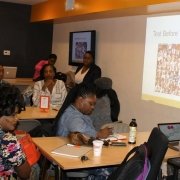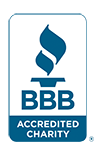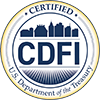NewsOne: Harlem Incubators Nurturing Vibrant Start-Up Scene
Editor’s Note: This is the first of a two-part series that examines entrepreneurship in Harlem, where NewsOne looks inside a few of the community’s business incubators. In Part 2, NewsOne explores how gentrification is helping to shape that growth.
Promptly at 7 p.m., Gina Ramcharan started a marketing lesson for her class of African-American female entrepreneurs.
The group of 25 women, from Millennials to Baby Boomers, filled a nicely renovated co-working space on Lenox Avenue in Harlem. Many of them, after a full day of work, arrived with cups of coffee and snacks to help energize them through the evening.
They meet every Monday night for an intensive 12-week business incubator program for African-American women called the Lillian Project, organized by the Harlem Business Alliance. These businesswomen are part of the wave of entrepreneurs in Harlem who are revitalizing the historic mecca of African-American culture.

Source: Nigel Roberts/Lillian Project entrepreneurs.
Following The Steps Of ‘Pig Foot Mary’
Harlem Business Alliance, which has fostered and advocated for Harlem’s Black-owned businesses for three decades, is a cornerstone in the business community.
The Lillian Project is named for Lillian Harris Dean, aka “pig foot Mary,” an entrepreneur who came to Harlem in 1901 from Mississippi and built a successful soul food business on her meager wages as a maid.
The first cohort, which graduates in December, is learning the nuts and bolts of starting and operating a successful business. It’s also a sisterhood in which the businesswomen encourage each other and share ideas.

Source: Nigel Roberts/Lillian Project entrepreneurs.
The businesses range from an environmentally conscious entrepreneur building a clothing line from recycled fabrics to another who plans to launch an alcohol-infused cupcake business.
A few of them, like Agzja Carey and Deondra Carter, plan to launch B Corps, a new category for companies that have a core social mission while also making profit.
Ramcharan said the selection committee chose Carter and Carey from among more than 100 applicants, in part, for their vision to create unique businesses that also fill community needs.

Source: Nigel Roberts / Gina Ramcharan teaches a marketing lesson for Lillian Project entrepreneurs.
Carey said she created the Sanaa Project LLC, an umbrella company for her education services, to deliver quality, innovative, cultural content that’s tailored to students and families of color.
She’s successfully provided programming under one of her brands, Crayons & Culture, in the Bedford Stuyvesant neighborhood of Brooklyn. With a new contract for services in Harlem, Carey said the Lillian Project is helping her to design an effective business model and to formulate a strategic plan for her expansion.
Cary, an experienced entrepreneur and social activist since 13, said education is her profession, but community organizing is at the core of what she does. The company’s mission is to “build institutions that redistribute the wealth and power among the Black community.”
According to Ramcharan, many of Harlem’s growing number of affluent Black residents take their children outside the community for school and have to look elsewhere for the cultural context of their education.
Services And Products To Meet The Needs Of Harlem’s Community
Carter, a real estate agent, wants to tackle the housing affordability problem—a growing challenge not just in Harlem, but also throughout New York City.
“I rent and sell all types of real estate in Harlem, including luxury condos and multi-million dollar renovated houses. But I see the need to help keep longtime residents in the community,” she said.
Carter’s company, Co-Own Inc., will offer clients of all races and ethnicities affordable housing options through collective purchasing power.
She has an “entrepreneurial gene,” inherited from her mother, experience operating small businesses, and has worked in marketing and financial services. The Lillian Project is helping her flesh out the details of her business plan.
In another part of the community, John Henry, managing director of Cofound Harlem, one of the community’s newest business incubators, is planting the seeds to create not just new businesses in Harlem, but also jobs and economic growth.
He negotiated a deal with a Harlem developer, who was committed to the community’s business development, to provide free space for the incubator and the new companies. In addition to rent-free space, Cofound offers its participants $50,000 of in-kind services and mentorship. Henry said he was able to get large companies, like Amazon and Google, to buy into their vision.
In exchange, the businesses in Cofound’s incubator must commit to staying in Harlem for at least four years.
The first cohort completed the 9-month program, which Henry calls a work in progress that he and his partners are fine-tuning. They selected just four companies out of about 150 applicants.
Henry said Cofound selected Creatr as one of the four companies in the incubator for a few reasons: team dynamics, great concept and proven track record.
Creatr is an online education platform, currently for photography but with a vision for additional virtual training in more intricate online design tools.

Source: Jamall Oluokan / R-L Jamall Oluokan, Shomari Miller and Jason DePeaux
Strategy Is The Name Of The Game
Jamall Oluokun, CEO of Creatr, told NewsOne that the idea came from the experience of operating Papercutmag.com, in which users submit photographs. He and his partners noticed that the quality of uploaded photographs was poor and decided to offer training through a membership-based site.
“We’re at the launch stage,” said Oluokun, who has years of experience working in the technology media space and is optimistic about his company’s future. “Our mentors have been instrumental in the areas of networking and guiding us in marketing and distribution.”
Silicon Harlem is also nurturing business growth in the community. It’s a for-profit company that is laying the infrastructure—both human and technological—to transform Harlem into an attractive venue for the tech industry.
Cofounder and CEO Clayton Banks explained that his company offers a virtual program. The organization advises companies, sits on their boards and helps them attract capital. Companies in its incubator range from financial technology to Internet of Things and digital education platforms.
Together, these incubators—and others scattered throughout the community—are nurturing the next generation of Harlem’s business leaders.
PHOTO CREDIT: Getty, Nigel Roberts



